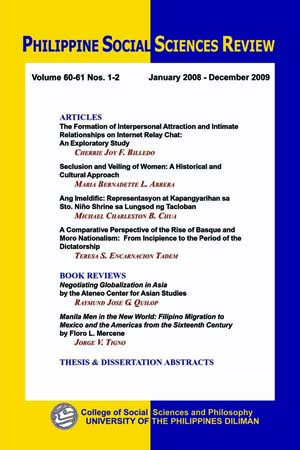A Comparative Perspective of the Rise of Basque and Moro Nationalism: From Incipience to the Period of the Dictatorship
Abstract
The article compares and contrasts the factors which brought about the emergence of Basque and Moro nationalism since their incipience, to the Franco and Marcos dictatorships in Spain and the Philippines, respectively. Basque nationalism was generally brought about by cultural and political marginality which was exacerbated by immigrants into the Basque region. The same reasons can be attributed to the rise of Moro nationalism, but unlike the Basques, this was aggravated by the Moro’s economic marginalization. As for the Basques, the assertion of their political institutions, culture, and identity was shared by the other regions in Spain such as Catalonia. This was not the case of Muslim Mindanao which was alone in its plight. National political events also heightened Basque and Moro nationalism. In the case of the former, this was brought about by the Carlist Wars which sought to get rid of its local institutions, the fueros. For the Moros, the colonization of the Philippines by Spain and later on by the U.S. forced an alien political and economic system on them which was perpetuated by the Filipino elites in a postcolonial state. The period of the dictatorships in Spain and in the Philippines witnessed the heightening of Basque and Moro nationalism which further strengthened their respective separatist movements, i.e., the Euskadi Ta Askatasuna (Euskadi and Freedom, or ETA) and the Moro National Liberation Front (MNLF). The weakening of the MNLF during the martial law period, however, was brought forth with the intervention of the Organization of Islamic Conference (OIC) to the plight of the Muslims in the Philippines, leading to the establishment of the Tripoli Agreement which was brokered by Libya between the Philippine government and the MNLF. As for the ETA, it remained strong even under the Franco dictatorship and was aided by France, which provided a safe haven to Basque refugees.__________
* Professor of political science and the director of the Third World Studies Center at the University of the Philippines Diliman. Email: teresatadem@zpdee.net
Published
2009-05-06
Section
Articles
Keywords
MNLF; Moro Nationalism; Basque; Philippines


